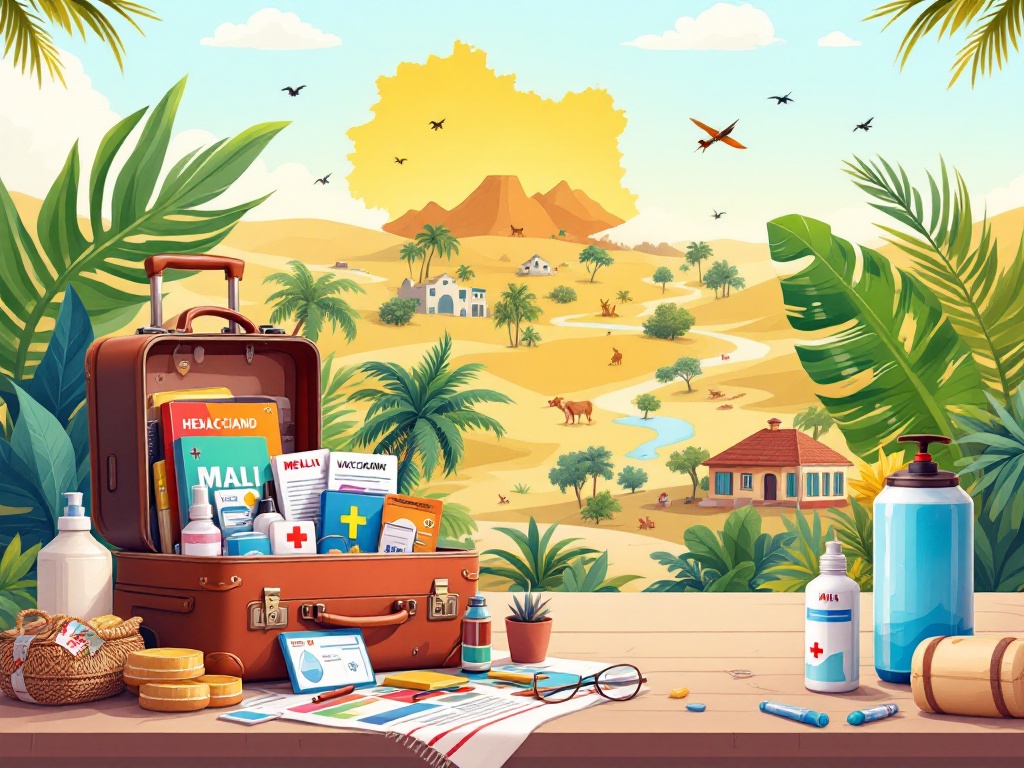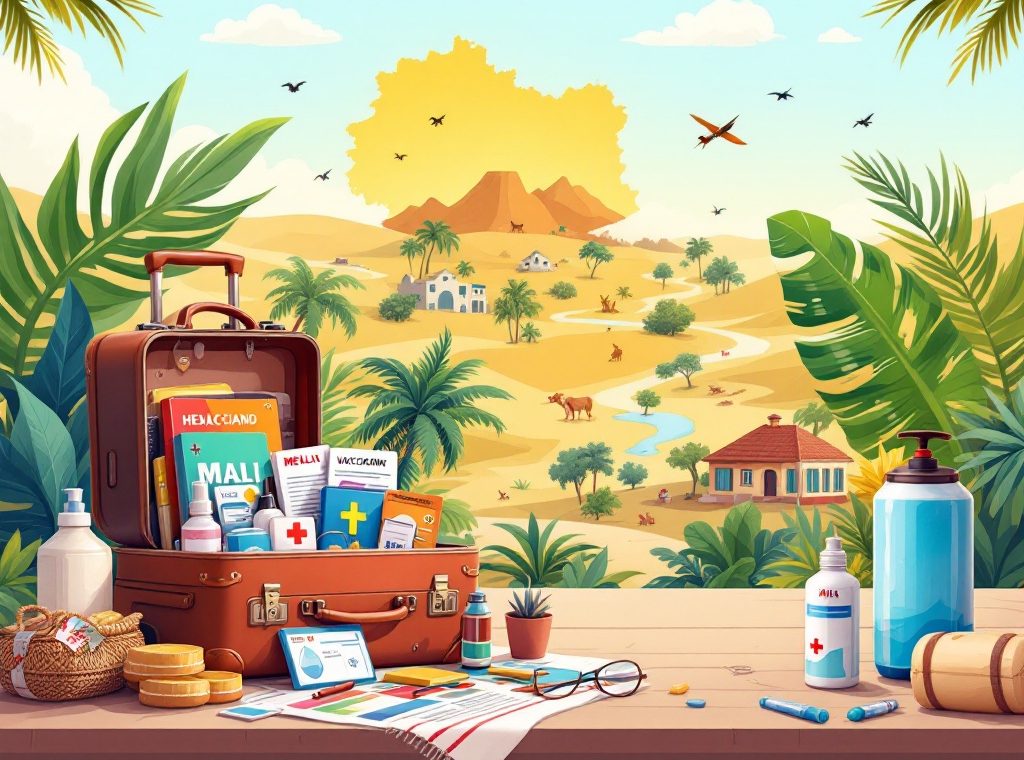Travel Vaccinations for Mali: How to Stay Safe from Tropical Diseases
Planning a trip to Mali? Don’t let health concerns derail your adventure. This guide provides crucial pre-travel health advice, including vital vaccinations like yellow fever (required for entry!), malaria prevention strategies, and tips for staying safe from mosquito-borne illnesses like dengue and Zika. Learn about food and water safety, essential hygiene practices, and other important precautions to ensure a healthy and enjoyable trip. Start planning your healthy Mali adventure today!
Important information

- Consult a travel health professional before your trip to Mali for personalized advice on vaccinations and health risks.
- Yellow fever vaccination is required for entry into Mali for anyone over nine months old.
- Malaria is a serious risk. Take antimalarial medication and prevent mosquito bites using repellent, nets, and protective clothing.
- Avoid contaminated water and food. Drink bottled or purified water, eat thoroughly cooked food, and practice good hygiene.
- Avoid contact with animals to prevent rabies. Consider a rabies vaccine if your activities put you at risk.
Pre-travel Health Advice: Preparing for Your Trip
Planning a trip to Mali? Prioritize your health by consulting a travel health professional. They can assess potential health risks and recommend necessary precautions. Ensure your routine vaccinations and boosters are up-to-date. Your healthcare provider can offer personalized advice based on your medical history and travel plans. This includes recommended vaccinations, malaria prevention strategies, and other essential safeguards for a healthy and safe trip.
Consult a travel health professional. Discuss potential health risks and necessary precautions for your trip to Mali.
Update your routine vaccinations and boosters. This will minimize potential health issues during your travels.
Get personalized advice from your healthcare provider. Discuss your medical history and itinerary to receive tailored recommendations.
Consulting Travel Health Professionals
Planning your trip to Mali? Consult a travel health professional. They will offer personalized advice based on your health status and itinerary. By assessing your medical history and travel plans, they can recommend necessary vaccinations and preventative medications. These experts provide crucial information on disease prevention and essential safety measures for Mali. Traveling with pre-existing conditions? A travel doctor can offer guidance on managing them abroad and help you prepare for potential health emergencies. Consult a travel health professional before your trip to Mali for peace of mind.
Health Check-up and Routine Vaccinations
Before your trip to Mali, consult your doctor about recommended vaccinations. Ensure routine vaccinations such as MMR, DTP, varicella, and influenza are up-to-date. Discuss Hepatitis A and B vaccines with your physician. Vaccinations for typhoid, meningococcal disease, yellow fever, and COVID-19 are also recommended. Your doctor can create a personalized vaccination plan based on your health and travel plans.
Entry Requirements and International Health Regulations
Planning a trip to Mali? A yellow fever vaccination certificate is essential if you’re arriving from a country with a yellow fever risk. Depending on current outbreaks, other vaccinations like measles may also be required. Consult your doctor and check for updates with the Malian embassy or consulate regarding the latest entry requirements. International Health Regulations are in effect to prevent disease transmission, so staying informed and prepared is crucial for a healthy journey.
Travel Vaccinations for Mali: Essential Health Recommendations
Planning a trip to Mali? Vaccinations are crucial for protecting your health. Ensure your routine immunizations are up-to-date, including measles, mumps, rubella (MMR), diphtheria, tetanus, pertussis (DTaP), varicella (chickenpox), and the flu shot.In addition to routine vaccines, consider getting vaccinated against hepatitis A and polio. A tetanus booster is also recommended.Depending on your travel plans, you might need additional vaccinations. Typhoid and hepatitis B are often advised, while meningococcal meningitis and rabies vaccines could be necessary for certain travelers. Yellow fever is a serious risk, so anyone aged 9 months or older must show proof of yellow fever vaccination to enter Mali. Consult your doctor or a travel health specialist. They can assess your risk factors based on your itinerary and medical history to recommend the most appropriate vaccinations for your trip to Mali.
Vaccination Requirements and Recommendations
Planning a trip to Mali? Ensure your health by getting the necessary vaccinations. Standard immunizations like measles, mumps, and rubella (MMR) are recommended. Yellow fever vaccination is essential for anyone over nine months of age and is actually required for entry. Hepatitis A and B are also advisable. Furthermore, consider getting vaccinated against typhoid and meningococcal meningitis. For personalized advice tailored to your health and itinerary, consult your doctor. They may suggest additional vaccinations, such as polio, tetanus, and rabies, depending on your individual risk factors.
Measles, Mumps, and Rubella (MMR): Ensure you are up-to-date with this standard immunization.
Yellow Fever: This vaccination is essential for anyone over nine months of age and is required for entry into Mali.
Hepatitis A and B: These vaccinations are highly recommended to protect against these viral infections.
Typhoid and Meningococcal Meningitis: Consider these vaccinations, especially if you plan to travel to rural areas or during the dry season.
Consult Your Doctor: For personalized advice, consult your doctor. They can assess your individual risk factors and recommend additional vaccinations such as polio, tetanus, and rabies.
Yellow Fever Vaccination Certificate
Travelers nine months and older require a yellow fever vaccination certificate to comply with international health regulations. The CDC further advises this vaccine for anyone traveling south of the Sahara Desert, a crucial step in preventing the virus’s international spread.
Recommended Vaccines for Travelers
Planning a trip to Mali? Prioritizing your health is crucial. Several vaccinations are recommended for a safe journey. Consult your healthcare professional for personalized advice, but generally recommended vaccinations include:
- hepatitis A and B,
- typhoid, and
- yellow fever.
Ensure your routine immunizations, such as MMR and diphtheria-tetanus-polio, are up to date.Depending on your itinerary and potential risk factors, additional precautions might be necessary. Vaccines for the following could be beneficial:
- meningococcal disease,
- rabies, and
- tuberculosis.
A healthcare professional can offer tailored guidance based on your specific circumstances. Consult your doctor for personalized recommendations to ensure a safe and healthy trip.
Hepatitis A and B
Planning a trip to Mali? Safeguard your health by getting vaccinated against Hepatitis A and B. These recommended vaccinations significantly reduce your risk of these infections.
Poliomyelitis and Tetanus
Visiting Mali? Ensure your polio and tetanus vaccinations are up-to-date for a healthy trip.
Cholera and Typhoid
Planning a trip to Mali? Safeguard your health by getting vaccinated against cholera and typhoid. These bacterial infections can cause debilitating diarrhea and, if left untreated, pose a serious health risk. Protect yourself before you go.
Meningococcal Disease and Rabies
Planning a trip to Mali? Consult your doctor for a personalized risk assessment to determine necessary vaccinations based on your individual health conditions and planned activities. Consider vaccinations for meningococcal disease and rabies, especially if your itinerary involves close proximity to animals.
Health Risks in Mali: Understanding Tropical Diseases
Malaria Precaution
Mali has a high risk of malaria. Discuss antimalarial medication with your doctor before, during, and after your trip. Remember, mosquitoes carrying malaria are most active at dusk and dawn.
Other Mosquito-Borne Illnesses
Dengue fever and chikungunya are also present in Mali. There are no vaccines for these illnesses, so preventing mosquito bites is crucial.
Schistosomiasis Risk
Schistosomiasis is a parasitic disease spread through contaminated freshwater. Avoid swimming or wading in freshwater sources in Mali.
Zika Virus Warning
Pregnant women, or those planning to become pregnant, should consult their doctor before traveling to Mali due to the risk of Zika virus, which can cause birth defects.
Malaria Prevention and Antimalarial Medications
Planning a trip to Mali? Be aware of the malaria risk. Consult your doctor about antimalarial medication, such as Atovaquone-proguanil, doxycycline, mefloquine, or tafenoquine, before, during, and after your trip. Protecting yourself from mosquito bites is crucial. Use DEET insect repellent, wear long sleeves and pants, and sleep under insecticide-treated nets. Chloroquine resistance is prevalent in Mali, making these precautions essential for your health.
Prophylaxis and Chemoprophylaxis
Malaria is a risk throughout Mali, so travelers should take preventive medicine. Due to chloroquine resistance, consider alternatives like Atovaquone-proguanil, doxycycline, mefloquine, or tafenoquine. Discuss your individual risk factors and itinerary with your doctor to determine the most suitable option.
Malaria-Transmitting Mosquitoes
Malaria is transmitted primarily through the bites of infected Anopheles mosquitoes, which are most active between dusk and dawn. Understanding their behavior is crucial for effective prevention.
These mosquitoes breed in stagnant water sources such as puddles, marshes, and rice paddies.
Attracted by human breath and body odor, they can be deterred through protective measures.
Using insect repellent, sleeping under mosquito nets, and wearing appropriate clothing provide substantial defense against bites.
Dengue Fever and Chikungunya Virus
Dengue fever and chikungunya are both transmitted by the *Aedes* mosquito, which bites during the daytime. Dengue typically causes high fever, a severe headache, and muscle and joint pain, sometimes accompanied by a rash. Chikungunya shares similar symptoms, particularly fever and pronounced joint pain. Travelers to Mali should prioritize mosquito bite prevention to reduce their risk of contracting these illnesses.
Schistosomiasis and Zika Virus Infection
Schistosomiasis, a parasitic disease, is contracted from contaminated freshwater sources. To avoid infection, refrain from swimming in lakes and rivers.
Mali also poses the risk of Zika virus, a mosquito-borne illness. Protecting yourself from mosquito bites will minimize your chance of contracting Zika.
Therefore, exercise caution around both water and insects when in Mali.
Mosquito Bite Prevention: Strategies for Travelers
Protect yourself from mosquito bites in Mali by using insect repellent on exposed skin. Use repellents containing DEET or picaridin for the best results. For nighttime protection, sleep under an insecticide-treated mosquito net.
Clothing
Appropriate clothing can significantly reduce mosquito bites. Wear long-sleeved shirts, long pants, and socks to minimize exposed skin. Light-colored clothing is preferable, as mosquitoes are attracted to darker shades. Treat clothing with permethrin for added protection.
Indoor Safety
Stay indoors whenever possible, especially in air-conditioned or screened areas. Choose accommodations with these features to reduce your risk.
Using Insect Repellent and Mosquito Nets
Protect yourself from mosquito bites by using insect repellent on exposed skin and sleeping under an insecticide-treated mosquito net. These measures significantly reduce your risk of contracting insect-borne illnesses, such as malaria, which poses a serious health risk in many regions.
Wearing Protective Clothing
Cover exposed skin. Wear long sleeves, pants, and socks to minimize the areas where mosquitoes can bite.
Choose light-colored clothing. Mosquitoes are more attracted to dark shades, so lighter colors offer better protection.
Treat clothes with permethrin. This insecticide effectively repels mosquitoes, providing an extra layer of defense.
Staying in Air-Conditioned or Screened Areas
Protecting yourself from mosquito bites can be easily achieved with air conditioning and window screens. These barriers effectively keep mosquitoes out, lowering your risk of contracting serious diseases like malaria, dengue fever, chikungunya, and Zika. By taking this simple precaution, you significantly reduce your chances of infection. Using air conditioning and window screens offers excellent protection against mosquito-borne illnesses.
Preventing Infection: Hygiene and Safety Measures
Ensure food safety. Eat thoroughly cooked food and drink bottled or purified water. Avoid raw meat, seafood, and eggs. Peel your own fruits and vegetables or wash them with purified water. It’s best to avoid street vendor food.
Protect yourself from contaminated water. Avoid swimming in Mali’s freshwater lakes and rivers to prevent Schistosomiasis. Drink and brush your teeth with only bottled or purified water. Skip ice cubes, as they may be made with contaminated water.
Maintain good personal hygiene. Wash your hands frequently with soap and water, especially before meals, after using the restroom, or when preparing food. If soap and water aren’t available, use an alcohol-based hand sanitizer. Avoid contact with blood or other bodily fluids.
Avoid animals. Steer clear of animals, including dogs, cats, and monkeys, as they can carry rabies and other diseases. Do not feed or touch stray animals. Seek immediate medical care if you are bitten or scratched.
Safe Food and Water Practices
Stay healthy on your travels by following these tips:
- Drink only bottled or boiled water.
- Enjoy hot, well-cooked meals.
- Avoid street vendor food.
- Refrain from consuming raw or undercooked foods, including fruits and vegetables.
- Skip tap water and ice cubes, opting for bottled water and drinks without ice.
- Choose reputable restaurants for your meals.
- Wash your hands frequently.
Avoiding Contaminated Water
Safeguard your health by opting for safe drinking water. Consider these options:
- Bottled water: a consistently safe choice.
- Boiling tap water: bring it to a rolling boil for one minute to eliminate most harmful contaminants.
- Purification tablets or filters: portable and effective for treating water on the go.
Avoid ice cubes, as their water source is often unknown. Following these guidelines will significantly lower your risk of waterborne illnesses.
Personal Hygiene Recommendations
Frequently wash your hands with soap and water, especially after using the restroom and before preparing or eating food. Avoid contact with blood and bodily fluids, and steer clear of animals that could carry diseases.
Hand Washing and Avoiding Blood or Body Fluids
Wash your hands frequently with soap and water, especially after using the restroom and before eating. This practice significantly reduces germ transmission.
Avoid contact with blood or bodily fluids to minimize your risk of infection.
Protecting yourself and others starts with clean hands.
Avoiding Contact with Animals
Protect yourself from rabies by avoiding contact with animals, especially high-risk species like dogs, cats, and monkeys. Because rabies is transmitted through bites and scratches, seek immediate medical attention if you’re bitten or scratched. If you plan to travel to a high-risk area, consider a pre-exposure vaccination for added safety.















